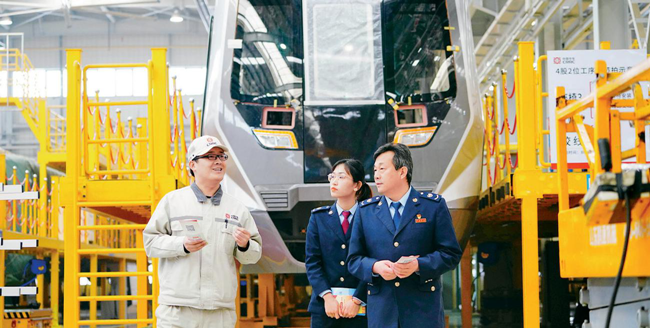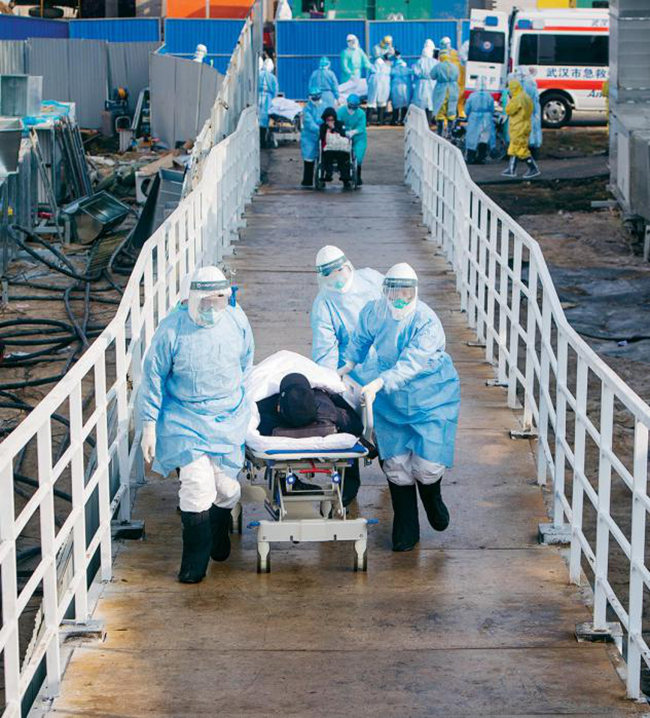Implementing a Higher-quality and More Effective Proactive Fiscal Policy
At the Central Economic Work Conference held from December 10-12, 2019, General Secretary Xi Jinping stressed that we must work vigorously to boost the quality and effectiveness of our proactive fiscal policy while attaching greater emphasis to structural adjustment. This represents a major decision and plan made by the CPC Central Committee on the basis of an accurate understanding of major domestic and international development trends, and an overall assessment of China's economic and social development, which has provided direction and fundamental guidelines for this year's fiscal policy.
I. Current situation makes it necessary for us to raise the quality and efficiency of our proactive fiscal policy.
The year 2020 will be a milestone in Chinese history as we will soon complete the first Centenary Goal of building a moderately prosperous society in all respects. At the same time, however, the domestic and international landscapes are growing increasingly complex, risks and challenges in economic development are piling up, and the imbalance between government revenue and expenditure is becoming more acute. Therefore, in order to adapt to current circumstances and realize the first Centenary Goal, it is imperative that we implement a higher-quality and more effective proactive fiscal policy while laying greater emphasis on structural adjustment. In particular, even though the COVID-19 epidemic that broke out earlier in the year has put growth of government revenue under pressure and created difficulties for businesses and producers, we must still increase fiscal expenditures to ensure that there is ample funding for epidemic prevention and control while continuing to look into introducing targeted policies to reduce taxes and fees on an interim basis, thereby relieving enterprises from operational difficulties. With this in mind, it is even more important that we work vigorously to raise the quality and efficiency of our proactive fiscal policy.
On the one hand, a proactive fiscal policy is necessary for maintaining policy stability and consistency and for remedying shortcomings in our efforts to build a moderately prosperous society in all respects. Since the 18th National Congress of the CPC in 2012, we have adhered to a proactive fiscal policy with unwavering commitment and ensured that this policy works in coordination with our other macroeconomic policies. We have thus generated powerful momentum for driving forward healthy and sustained socioeconomic development, significantly improving living standards, and building a moderately prosperous society in all respects. However, there remain a number of shortcomings in areas including urban-rural and regional development, ecological and environmental protection, science and technology, education, and social security. China is also at a pivotal stage in which it is transitioning to new modes of development, optimizing the structure of the economy, and switching to new drivers of growth, and the impacts of these three processes are continuing to reverberate. In addition, downward pressure on China's economy is mounting as a result of a tightening external environment caused by rampant protectionism and unilateralism as well as markedly increased sources of global risk and disruption. Even more pressing at present are the extraordinarily arduous tasks involved in confronting the epidemic, and it is absolutely imperative to ensure that medical treatment and prevention and control efforts are not delayed due to funding issues. Therefore, continuing to implement a proactive fiscal policy will be conducive to effectively alleviating the downward pressure on China's economy and addressing prominent shortcomings in our efforts to build a moderately prosperous society in all respects, and is particularly important for winning a decisive victory against the COVID-19 epidemic, securing solid progress in the critical battles against poverty, pollution, and potential risks and accomplishing our goal of building a moderately prosperous society in all respects while laying solid foundations for progressing toward the second Centenary Goal. On the other hand, implementing a higher-quality and more effective proactive fiscal policy while laying greater emphasis on structural adjustment is essential for further easing the imbalance between revenue and expenditure and achieving sustainable development of government finance and the economy. In 2019, China introduced its largest tax and fee cuts ever with new reductions totaling over 2 trillion yuan, accounting for more than 2 % of GDP. Although implementing a series of major tax and fee cuts will reduce government revenue at first, it will also spur economic growth that will ultimately bring about increased revenue. But with the economy under mounting downward pressure, there will be diminished momentum for driving the growth of government revenue. The impacts of reduced government revenue on expenditures will vary at different levels. In some localities, the imbalance between revenue and expenditure is more overt. Some local governments face strain on their financial resources because their use of funds has become rigid to varying extents. This presents challenges for guaranteeing normal operations, payment of salaries, and the basic wellbeing of the people. Government finance as a whole will be under pressure as a result of decreased revenue and increased expenditures for some time to come, and we will be forced to walk a tightrope in fiscal operations. Under these circumstances, it is not a viable option to implement a proactive fiscal policy by simply expanding government expenditures. Instead, we must tap internal potential by optimizing the structure of budgetary expenditures and putting both reserve funds and additional funds to work, while using our policies and funds in a more targeted, precise, and effective manner. By doing so, we can keep government finance and the economy running smoothly.
II. Understanding the new implications of a proactive fiscal policy
In implementing a proactive fiscal policy this year, we will focus on both "quality" and "quantity." With regard to the former, this means that we will step up countercyclical regulation, consolidate and amplify the effects of tax and fee cuts, and maintain reasonable and appropriate government spending. With regard to the latter, it means that we will optimize the allocation and structure of government funds, and ensure that funds are used more productively. More efforts will also be made on the issue of sustainability. With limited room for the government to take additional measures as a result of mounting pressure in maintaining a balanced budget, it is crucial that we spend frugally for the benefit of the people. We must focus on raising the quality and effectiveness of our policies in the process of structural adjustment, and see that our finite financial resources are used where they will have the greatest impact. We will thus adopt an intensive fiscal policy that involves the six following main components.

Officials from the tax bureau of Luancheng District, Shijiazhuang, Hebei Province visit CRRC Shijiazhuang Vehicle Co., Ltd. on January 16, 2020. In 2019, China launched the most extensive tax and fee reduction measures in its history, with new cuts totaling well over 2 trillion yuan made over the course of the year, accounting for more than 2% of GDP.
PHOTO BY XINHUA REPORTER XING GUANGLI
First, cutting taxes and fees. By reducing burdens on enterprises and individuals, we will advance epidemic prevention and control and spur economic growth.
Tax and fee reduction is the most important embodiment of a proactive fiscal policy. It allows the government to transfer more fiscal resources to market entities, which helps further energize the market and stimulate internal impetus for economic growth. After a significant reduction of taxes and fees, there will be an acute imbalance between government revenue and expenditure in the short term, but over the long term, government revenue will gradually increase nevertheless as the performance of enterprises improves and the tax base broadens. We should see the big picture and take future effects into consideration. No matter how great the difficulties that lay before us, we must ensure thorough and effective implementation of tax and fee reduction policies. At present, as we seek to support the battle against COVID-19 and respond to downward pressure on the economy, it is vital that we implement tax and fee reductions on a wider scale to relieve burdens on enterprises so that they can fight through this difficult time. This year, we will take further steps to implement and improve policies to reduce the value added tax (VAT). For instance, we will allow enterprises that produce key epidemic prevention and control supplies to count spending on new equipment for the purpose of expanding capacity as part of their current costs and offer them a one-off deduction on their corporate income tax. We will also exempt taxpayers who earn income from transporting key supplies for epidemic prevention and control, delivering living necessities to residents, and providing public transportation services and domestic services from paying VAT on this income. Meanwhile, we will continue to research and improve tax policies with a view to boosting high-quality development, encouraging scientific and technological innovation, attracting high-end talent, and bolstering export growth. Finance and tax departments will cooperate with each other on closely monitoring how tax burdens change in all sectors, and see that the three requirements of ensuring that tax burdens are reduced significantly in major industries such as manufacturing, reduced to a certain extent in the construction and transportation industries, and only allowed to decrease and not increase in other industries are met. Moreover, we will look into and address problems reported by enterprises in a timely manner, and continue to leverage the effects of tax and fee reduction policies.

A scene showing birds and humans sharing a harmonious habitat in Mile, Honghe Hani and Yi Autonomous Prefecture, Yunnan Province on February 1, 2020. Though China's environmental quality has improved overall, our efforts to build an ecological civilization are now at a crucial stage in which we must carry forward despite heavy strain and immense pressure. It is therefore imperative that we continue to intensify fiscal support for environmental governance and protection. In recent years, Mile has followed the principle that lucid waters and lush mountains are invaluable assets, achieving real results in environmental protection. PEOPLE'S DAILY / PHOTO BY PU JIAYONG
Second, promoting structural adjustment. By reducing general expenditures and guaranteeing spending in key areas, we will optimize the allocation of government funds.
The scale of government expenditure must be commensurate with the needs of economic and social development. Unrestricted expansion of fiscal spending is not only impractical, but will also leave latent risks for future development. With notable imbalances between government revenue and expenditure this year, it is important that we spend within our means and focus more attention on optimizing the government spending structure. We will look into utilizing the concept of zero-based budgeting, set budgets through a rational approach according to actual needs, and improve allocation mechanisms that enable flexible adjustment of budgetary funds so that spending can be maintained in some areas and reduced in others, thereby breaking rigid spending patterns. Specific standards must be defined for all expenditures so as to prevent unrestrained spending. Governments at all levels must tighten their belts. The central government will take the lead to slash expenditures that are not essential or not earmarked for key projects, strictly limit spending on new projects, and cancel spending on unnecessary projects. It will, in principle, refrain from establishing any new expenditure items. Local governments should make a major push to reduce general expenditures in order to minimize unnecessary spending. The funds saved will be used to intensify support for key areas, such as education, work related to agriculture, rural areas, and rural residents, epidemic prevention and control, and the critical battles against poverty, pollution, and potential risks. While budgets are being implemented, we should see that idle budgetary funds and assets are put to better use, and recall funds for projects that are not ready to be launched, are making slow progress, or have anticipated spending difficulties in accordance with relevant regulations so that these funds can be reallocated to key areas in a coordinated manner.
Third, optimizing allocation. By increasing general transfer payments, we will ensure that local governments are able to pay salaries, function normally, and safeguard the people's basic wellbeing.
Due to a number of factors, regions in China differ from each other in terms of their fiscal resources, with the northeastern and western regions being comparatively weak in this regard. Local governments, especially certain county-level governments, face fiscal constraints caused by difficulties in transferring funds and strapped treasuries, putting quite a large amount of pressure on themselves as they try to pay salaries, function normally, and safeguard the people's basic living needs. To help alleviate this problem, the central government will increase transfer payments to local governments. In particular, we will give priority to raising general transfer payments by following the principle that general transfer payments must grow at significantly higher rate than central government expenditures. Moreover, we will see that increases are weighted toward old revolutionary base areas, areas with large ethnic minority populations, border areas, and impoverished areas. We will grant local governments greater autonomy in utilizing their financial resources to ease pressure on spending caused by slowing revenue growth while making corresponding decreases in special transfer payments to them. All localities must ensure that they use central government transfer payments and their own financial resources in a coordinated manner, allocate more funds to governments at lower levels, and strengthen the capacity of governments at county and township levels and regions facing financial difficulties to guarantee basic public wellbeing. Meanwhile, under the principle that county-level governments assume the lead responsibility while provincial governments provide safety nets, local governments must give priority to paying salaries, functioning normally, and safeguarding basic living needs in their spending, and take firm steps to see that these three requirements are met.

Medical personnel transfer a patient to a ward at Huoshenshan Hospital in Wuhan after the hospital began admitting confirmed novel coronavirus cases on February 4, 2020. Facing complex and severe challenges stemming from the epidemic, government spending in 2020 will prioritize support of prevention and control. Funds will be raised and allocated in a reasonable manner, and focused on areas including medical treatment, subsidies for medical personnel and anti-epidemic workers, procurement of equipment and supplies needed in prevention and control, and vaccine R&D.
PHOTO BY XINHUA REPORTER XIAO YIJIU
Fourth, spending on the basis of revenue. By clearly defining fiscal powers and expenditure responsibilities, we will develop a sustainable fiscal system.
Spending on the basis of revenue is the basic principle that finance departments must abide by in making arrangements related to revenue and expenditure, as well as an important approach for realizing rational management of public finance. Revenue is the foundation for expenditure. In budgeting revenue, we must follow a realistic and pragmatic approach and make reasonable projections by taking the impact of tax and fee reduction policies and downward pressure on the economy into full account. We should estimate revenue targets in a prudent manner, and leave some leeway in case the implementation of tax and fee reduction policies is impeded due to excessively high revenue targets. In budgeting expenditures, we should limit spending and control the growth of spending according to revenue, putting an end to the practice of arranging expenditures that exceed financial resources. We should clearly define responsibilities for expenditures by continuing reforms to divide these responsibilities and fiscal powers between central and local governments on a sector-by-sector basis, ensuring that the fiscal powers, responsibilities for expenditures, and financial resources of governments at all levels fit together well. Remaining committed to putting forward our best effort while working within our means, we should strengthen assessment of our financial capacity to take on major projects, overhaul and regulate expenditure policies that make commitments beyond our financial capacity or inject excessive funds, and establish mechanisms for balancing public-wellbeing policies with the growth of government revenue.
























